Here’s a great interview with the amazing mouse on the keys, originally published at CONTRAST some time ago around the time their live DVD was released. If you’re a fan of mouse on the keys, and you’re the type of fan that’s interested in interviews and that sort of thing, then I’m sure you know just how scarcely mouse on the keys has those available (not to mention ones in English!). For those fans among you this should be a treat.
Original interview & text: Shota Kato
Photography: WYPAX
English translation: Henkka
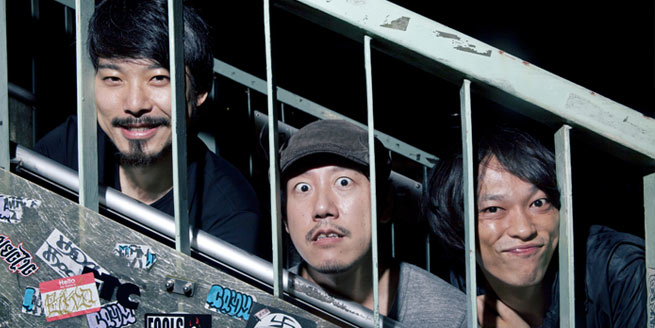
The subject of mouse on the keys’ DVD “irreversible” is their third European tour in March of 2011 that took them to the UK, Germany and Poland. It’s a lively tour movie that showcases their journey through seven performances in three countries. Captivating are not only the live performances filmed from a close distance, but also the clips of Europe in between with its impressive scenery and townscape. Depending on the person watching, there are various things to be taken away from it. That is one of the strong points of the work.
The tour took place from March 4th through the 12th. As you can see from this schedule, mouse on the keys came to know of the reality of Japan being shook by an unprecedented earthquake while they were in the middle of their tour. In other words, while “irreversible” is a pure record of their tour, it also captures how they experienced 3/11 while in Europe. Realizing that, it feels to me like a documentary that depicts not only the growth of this band on tour, but also the change of an era.
The director for this work was independent film director MINORxU. Though it is talked about in this interview, please do take note of how deeply involved he was in the making as well. You’ll come to know what kind of environments mouse on the keys and MINORxU worked in, what kind of musicians they spent time with, and you’ll get context as to how they lived during that time. I got to talk to mouse on the keys and look back on episodes that happened during the tour, the history that’s documented on “irreversible” and what can now be said about the things that aren’t documented.
I got to see your new DVD a while ago, and it was actually my introduction to you guys.
Kawasaki Akira: Oh, I’m happy to hear that.
Looking at the formation of mouse on the keys, it could be described as a so-called “unit” made up of drums, keyboards and keyboards. Listening to your recorded material, I think some would get the impression of it being music that is kind of smart and of intellectual.
Kawasaki: Right.
I think that’s a fair viewpoint, too, but to those who have seen mouse on the keys live, they think of you as a band more than anything. I felt that this documentary captures that atmosphere and tension of a live band.
Kawasaki: Thank you. The DVD features footage of our third European tour that we did in March. I think we grew as a live band on our previous two tours there last year. At the end of the second one, we were drinking with everyone and talking about how it might be good to capture that feeling onto film. That’s when the third tour got decided upon. We’re the kind of band that just goes “hey, we wanna do that, why don’t we just set a date for it and do it“, and that’s how talks about the DVD began.
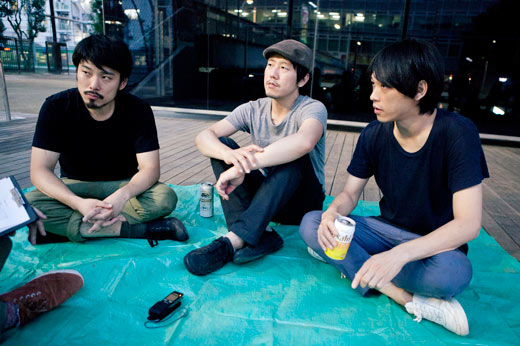
How did plans of your European tours start taking shape in the first place?
Kawasaki: The recordings that we’d put out in Japan got a European release through the German denovali records, so we thought we’d promote them by touring there. For the first and second runs, we got the label owner Timo to be in charge of booking our shows. That’s why we did more shows then, and even got some advertising for them. This time around, we did the booking ourselves. Niitome did all of it since he can speak English.
Niitome Daisuke: I can fake it. (laughs)
(laughs) By the way, the director of the DVD, MINORxU, is currently filming a documentary of LOSTAGE, and he’s also filmed some past live footage of mouse on the keys, right?
Kawasaki: When we were thinking about who we could ask to direct it, someone who we could trust and who could do all of it from filming to editing, the first person we thought of was MINORxU. If you watch the footage of our Shibuya O-EAST performance on Youtube, you’ll notice that it’s all shot on one camera. That’s his distinctive characteristic and he’s very good at it. We were sure it’d turn out great if we got him to do it for us and that’s why we asked him. MINORxU was happy to do it.
This work has the components of both a live DVD as well as a documentary, but typically you’d expect a documentary to have interviews and other chatter. I think viewers will be surprised to see that the only spoken word comes in the form of Niitome’s short MC on stage.
Kawasaki: When you say the word “documentary”, you may associate it with someone like Michael Moore or, if you want band documentaries, Metallica or (bloodthirsty butchers’) kocorono. I think band documentaries have the image of being about revealing the hardships of the band, or showing their humanity and the fabric of their relationships. If you watch our DVD with that kind of mindset, you’ll probably go “Huh? Isn’t this a bit different from a documentary?“
Right. It might feel like something’s out of place.
Kawasaki: We decided amongst the band and MINORxU that rather than a so-called documentary, we’d make it a work that captures the atmosphere and scenery of Europe as well as our live performance. But calling it simply a live DVD would also be incorrect. There are shots that are way too zoomed-in on a member of the band or there’s unintended noise during our performance that we just kept and used as-is. That’d probably be unacceptable if it was primarily a live DVD, but we also wanted to show Europe as it is. In that sense, you might call it a documentary. So in other words though, this work isn’t a documentary nor is it a live DVD — it’s something in-between.
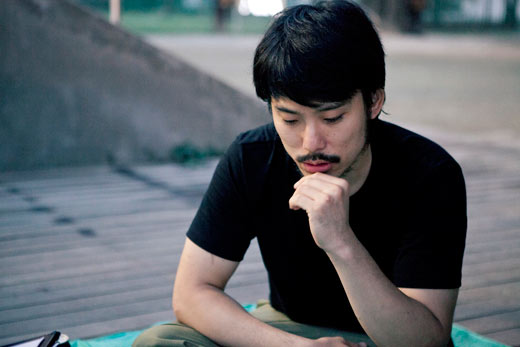
As for the European atmosphere, I think the way the townscape is filmed brings the nuance of a road movie with it. It kind of feels like you’re watching a music video. So there are a variety of components present.
Kawasaki: It’s good if you feel that way. It’s up to the viewer to feel about it as they will, but I think there’s a feeling of being a live best-of of our 5-year history so far and there are three as of yet unreleased songs included, too. We felt releasing it now seemed like a fun idea.
Niitome: For us, the 3/11 incident happened in the midst of that tour. It’s also a genuine record of that time.
At the kowloon tour finale, Kawasaki said that the title “irreversible” means “a time you can’t go back to.” That was the intended meaning — in more ways than one.
Kawasaki: After we got back from our European tour, I noticed I had a headache. Thanks to my good constitution I’d never had headaches before so I thought “huh, that’s weird” and went to the hospital for a check-up. My diagnosis was “concealed cerebral infarction.” I had an MRI taken and in the cross-section of my brain you could see all this white stuff. I was told “your capillary vessels are dying.” This is common if you’re in your 60’s, but they told me that “For people in their 30’s, this doesn’t happen much. It’s a bit strange.“
The tour took its toll on you physically.
Kawasaki: It did. From blood tests to urine tests and EKG’s, they could find nothing wrong with me. The only thing off was the MRI of my brain. I don’t even have diabetes, so my doctor couldn’t figure out a reason. So I looked on the net and found something about this American metal guitarist who had collapsed during a hard tour because of headbanging. They examined him and found that he’d had a cerebral infarction.
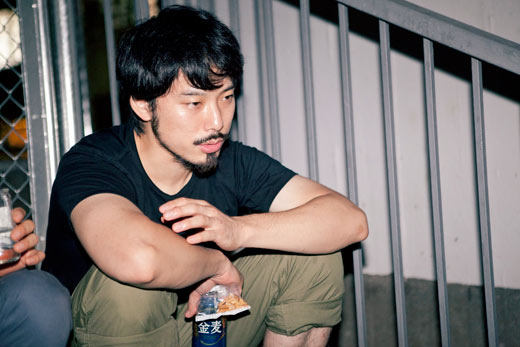
This might be surprising to people who haven’t seen mouse on the keys live, but your live shows are actually quite chaotic.
Kawasaki: I’m always banging my head. I’ve also worked at those venues in my personal life and I’d always work much harder than I maybe ought to have, you know. I’d be working in this really hot place without drinking any water at all. Up until now I’d leave it up to my physical strength to cope with it, but I guess this is what happens when you get to my age.
Have you had any similar past incidents not caused by live performances?
Kawasaki: I’ve had this mentality of “if I’m going to do something, I’m going to do it to my utmost limit“, like if I had a death wish. I think that overdoing took its toll on me because I’ve been suffering from nosebleeds and dizziness after our European tour. While our staging keeps getting flashier, I’m trying to restrain from headbanging since that tour. So to put it simply, the “irreversible” refers to how I can’t go back to that past self of mine, and also the fact how 3/11 happened in the middle of that tour — it was a different Japan we came back to. The title stands for the fact that we can’t go back to how things were before.
Kiyota Atsushi: From the band’s viewpoint, rather than being a work we’re going to look back on some years from now, it’s more like in it we’ve preserved one period of time which we’re just trying to portray well.
Kawasaki: Yeah. This European tour materialized via the use of email and Facebook, and we just took that materialized period of time, put it all in one package and released it on DVD…
Niitome: The fact that a band like us can even do things like this is thanks to the internet, I think. The fact that our CD’s got a European release is thanks to the net, and even the exchanges we had to make this tour happen were all had via email.
Kawasaki: With circumstances like that, the fact that an independent Japanese band was able have three European tours in roughly a year’s time is also a sign of the times. So on that point, too, this DVD preserved the current moment.
I was actually in Europe on 3/11, too.
Niitome: Really! Where?
France, so we were relatively close. I was there for my honeymoon, though. (laughs)
Niitome: You must’ve had pretty conflicting feelings about being on your honeymoon on 3/11.
Japanese people who were abroad on 3/11 must be a tiny minority. There’s not many people you can identify with on that subject. So I’d really like to hear what your thoughts were at the time you were in Europe.
Niitome: We were watching the situation progress on Ustream and stuff while on tour, and we were thinking “there’s just no way to tell what’s going on there before we get back.” But even when we got back, we still didn’t know what was going on — we hadn’t personally experienced those tremors.
I know that feeling. Also, when we were in France, this British couple we didn’t know came up to us and asked us if our families and friends were fine.
Kawasaki: I, too, was approached by the locals on the streets and at the venues. I noticed how they really worry for you at times like that. During Niitome’s MC in Liverpool, everyone expressed how worried they were. Someone had put Niitame’s words that day in their Facebook “memorable quotes” and stuff.
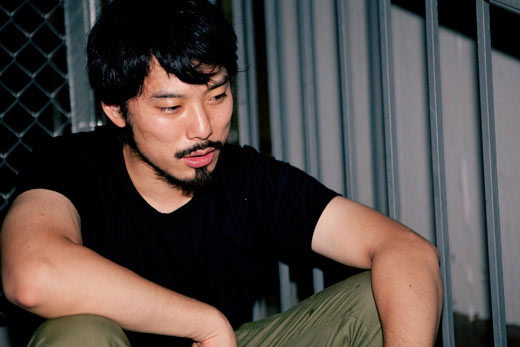
Ah. It must’ve been a very special atmosphere at the show you played in Liverpool on 3/11.
Niitome: Definitely.
Kawasaki: We launched right into it, wanting our thoughts to reach all the way to Japan. We couldn’t return to Japan and we weren’t even able to properly contact our families to make sure they were safe. We were so worried, but we wanted to put on a good show, directing our energy to Japan while also conveying that to the locals.
How was it after you came back to Japan? For me, I couldn’t help but feel out of it for quite a while, even though in my head I knew we’d experienced an awful disaster.
Kawasaki: I learned about this on the news… earthquake drunkenness, was it? After we got back, many of my friends would suddenly look surprised and say “did it just shake right now?“
Niitome: Then there was the power plant issue which I strongly felt people were trying to avoid talking about. This is going to sound extreme, but I thought people were buying into a false sense of security and I seriously thought we were all going to get contaminated and die. Since then, I’ve started thinking more about the way I live my life. It was a turning point for me.
After that, mouse on the keys released the audio of a session with Aku for charity and gathered goods at Shimokitazawa ERA which you then personally delivered to the areas affected by the earthquake.
Kawasaki: We felt like we wanted to do something after we got back. After seeing toe release “ordinary days”, I started thinking about what I could do. Right before we headed out on our European tour, we did a session with Aku. We thought it was a good show and after listening to the audio, we thought we may as well release it. Then 3/11 happened, and we decided to release the audio from that session but donate the proceedings to charity. Senoo GEE of Aku is from Miyagi and his house was damaged in the disaster, and places like Onagawa and Ishinomaki are also featured in Aku’s lyrics.
Niitome: By chance, there were also lyrics in our session about Onagawa’s scenery. There’s a connection.
Kawasaki: If you haven’t yet, we’d definitely like you to hear it. If you download it, your donation will reach the disaster areas.
Niitome: Our methods of promoting it are limited, but we want lots of people to hear it.
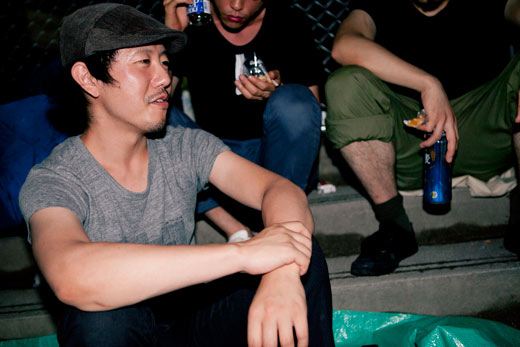
Aside from the 3/11 show, the response at the other venues was amazing, too.
Niitome: There was one person who had traveled from outside the country just to see our show in Italy. Aside from that, there were quite a few people who’d traveled halfway across the country for us. I think they want to see Japanese bands over there a lot more than everyone thinks. It can be kind of scary, but I think Japanese bands ought to play abroad more. Once you go there and check it out for yourself, you’re surely going to want to go again.
The atmosphere at their venues is different as well. For example at the Warsaw venue, there was the position of the projector and the latticework they had on stage.
Niitome: It’s like we were playing inside a jail cell.
Kawasaki: We were thinking about putting some more Warsaw footage on the DVD as well, but because of editorial issues and stuff, we just went “nah, let’s just leave it out.” (laughs)
Niitome: There was stuff like Kawasaki climbing out of the jail cell and whatnot. (laughs)
Kawasaki: Climbing all the way up and jumping down.
Kiyota: Rolling around on the floor and stuff. (laughs)
(laughs) According to Twitter rumors about the Duisburg show, Kiyota did a handstand on top of his keyboard and fell down approximately a second later.
Kawasaki: Yeah, at first we thought we’d include that, too.
Niitome: That was great. His motor nerves are pretty impressive.
Kiyota: No, I fell down because they’re not impressive. (laughs)
Kawasaki: And even though he did, he was trying to go at it again and again.
Very acrobatic. (laughs) You must’ve been exhausted, but you were still able to give your all at each performance because of the adrenalin, right?
Kiyota: Well, lately it feels that those differences in audience reactions aren’t as present anymore. Our audiences get fired up regardless of if it’s Japan or abroad.
Kawasaki: Sometimes they’ll get more fired up in Shizuoka than they do in Europe, even to the point where we’re going all “huh?!” (laughs)
Niitome: Kawasaki was again climbing up some cage and stuff. (laughs)
Kawasaki: Ah, yeah, that was pretty crazy, the tour we did with kowloon a while back.
Ahh, I saw that on YouTube. (laughs) Just what on earth caused that sort of excitement?!
Niitome: I’ve no idea.
Kawasaki: In a way that kind of exceeded the global standard.
Niitome: Maybe Keisaku (Nakamura Keisaku, kowloon, stim) downing all those high-balls after dinner had something to do with it.
Kiyota: Now that’s what I call “Saigo no Bansan“ (“the last supper“). (laughs)
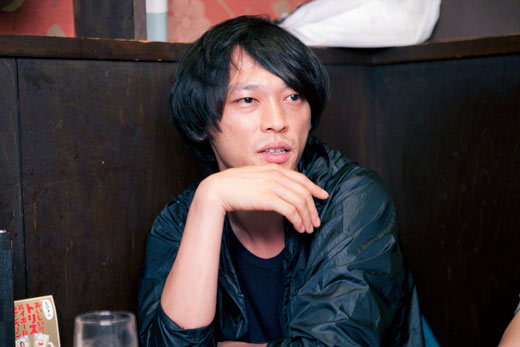
More like the first supper. (laughs)
Kiyota: Right. (laughs) As for the sound, Europe is also a lot drier in terms of humidity than Japan. And not only is the climate different, but the voltage is, too.
Niitome: We had surprisingly many shows in Europe with only us on the bill. I think Poland must’ve been almost exclusively just us performing.
Ah, I didn’t know that. At Blue Note as well as at the tour finale in London, you performed on the floor, right?
Kawasaki: That place is sort of like a gymnasium. They do have a stage, but the crowd gets more into it the closer they are so we just played on the floor.
Niitome: The old man in charge of the PA was looking at us all puzzled.
Kawasaki: The sound guys over there are either very fussy, or they don’t do anything at all. Our PA guy Yama-chan (Yamashita Daisuke) took care of all of that for us.
By the way, about that guy featured in the London live footage…
Kiyota: Ah, the usual guy. (laughs)
Kawasaki: Maybe we shouldn’t reveal what’s on it… but the guy at the end going all “Wooooo! mouse on the keys!“, that was him. (laughs)
As I thought. (laughs)
Kawasaki: Even though we were taking a break, they were just playing with our keyboards and shouting and stuff. (laughs)
You can see the faces of the audience in the London footage. There were some Japanese people there too, right?
Kiyota: One or two at every venue, yeah.
Kawasaki: There were even more Japanese people to see us in London this time. Not so much for Poland, though.
Niitome: Japanese people don’t seem to go there so much, Poland I mean. Poland has quite a lot of people who are learning Japanese and will even talk to you in Japanese.
Kiyota: “You are beautiful“… (laughs)
What was that?
Kawasaki: There was a line at the merchandise table of our show at Klub Re (a venue in Krakow, Poland), and there was this cute girl who was asking for our autographs. When she came up to our support member Sasaki Daisuke (trumpet), he just went “you are beautiful“. (laughs)
Niitome: He’s kinda direct.
Kiyota: The girl was looking pretty troubled. (laughs)
Kawasaki: If you watch the DVD, you’ll notice that Sasaki dyed his hair blonde. That’s just another thing that captured the hearts of the anime or visual kei loving girl fans’ hearts. Someone even yelled “Sasaki’s hair rocks!” and stuff.
Niitome: mouse on the keys’ Facebook even has comments coming in just about him. “Say hi to Sasaki!” and all that.
Kawasaki: Maybe we shouldn’t ask him to be our support member anymore. (laughs)
Niitome: Sasaki’s never went back from his blonde hair since then. He’s made it even brighter.
Kiyota: He really has.
Niitome: “irreversible” indeed.
Kawasaki: He was saying so himself. “There’s no going back.” (laughs)
(laughs) He must really stand out in all the merchandise.
Kawasaki: He’s very noticeable on the CD’s obi strip, right?
Niitome: Even though the rest is all in Japanese, his name’s written as “Daisuke Sasaki” in English. (laughs)
There must’ve been quite a demand for goods then.
Kawasaki: They bought lots of Sasaki’s CD, but also stuff from Nemoto Jun’s groups Z, hununhum and There is a light that never goes out.
Kiyota: There’s a demand for Japanese music.
Niitome: Jun did the MC for the tour so he got to promote his bands, too.
Kawasaki: Yeah. He was singing Z’s songs a capella. “Kyou wa hitori de〜”
Niitome: “Shinkyou“, right? That one sold a lot.
Kawasaki: Yeah. People were coming up to the merch table, going “which CD has that song?“
Wow, that’s pretty cool!
Niitome: We were just joking around in MC’s by saying stuff like “we don’t have money for our plane tickets back home so come buy our goods!” And then after the show they really did come and buy stuff.
Kawasaki: Even though they were just laughing during the MC.
Niitome: We probably wouldn’t have sold a thing had we forgotten to mention it. (bitter laugh)
Kiyota: Call & response in effect right there.
Niitome: Right? Their feelings of wanting to support the band were really conveyed to us.
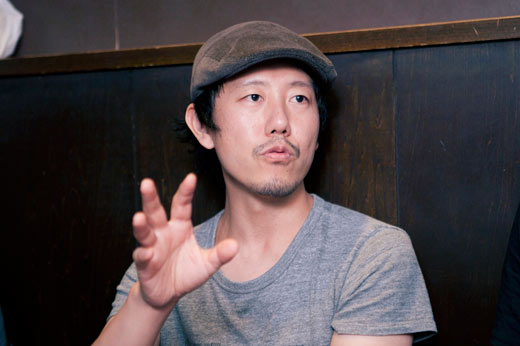
Kawasaki: Also, the catering at the venue had free all-you-can-drink and all-you-can-eat. We asked why they did that and they told us that, you know, despite the fact that even though they probably have both good and bad days profit-wise, they’d split the profits evenly by giving everyone free food and stuff like that.
Kiyota: It was like this venue where the people who did the booking, the staff, the ticket collectors… everyone was a volunteer. It’s like the venue is the area’s playground for them.
Niitome: Everyone gets together to have fun at a place with music. They all have real jobs but once that’s done for the day, they come over to help out. They have a couple of beers, listen to music and have fun. That’s the kind of place it was.
Kawasaki: England is like Japan in that they don’t have catering.
Since I’ve got the chance, could I ask you about that that chaotic element that you create at your live shows that’s also strongly present on your DVD?
Kawasaki: It’s an accumulation of various things that led to it happening. I think the first time it happened was at this festival called neutral nation.
I saw that show as well.
Niitome: Before that show started, I just let out this “uoooohhh!” scream without thinking about it, and I was doing this kind of MC Hammer impression during the mic check. It just came out. (laughs) I was screaming and doing blast beats and stuff. We hadn’t had times like that before all that much, but that time I just felt like doing it. Right after that we headed out to our second European tour of 14 shows with that feeling intact, which is when we just developed that beast inside of us that just suddenly comes out. (laughs)
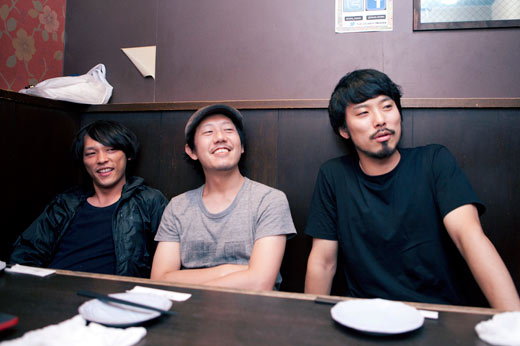
So it just came to you instantaneously. Like by instinct.
Kawasaki: I think it was because we hated being thought of as insignificant. Up until then we’d been careful in our performances, we’d have video with us and we’d worry too much about keeping appearances. But when you’re doing outdoors festivals, you can’t have video. At least when we had video, we could perform without moving around too much. We started thinking about just how far we could take our performance if we tried, and neutral nation is where it just came out on the spur of the moment. Ah, but now as I’m talking, I remembered something… can I go on?
Please do. (laughs)
Kawasaki: Before that, I appeared at an event called Three Drs. Two Bass at Shinjuku LOFT.
It was an event of improvised performance, right?
Kawasaki: The drummers at the event were me, herAx (200mph) and MUROCHIN (WRENCH). Every one of us are hard hitters so I was thinking probably none of us would go for a delicate style of playing that night. And just like I had expected, you really couldn’t hear many finer sounds. Since it was all improvisation, we hadn’t had any meeting as to what we were going to play, so I had to figure out by myself what I was going to do with the nearly two hour time slot that had been given to me. So I stopped playing the drums, I grabbed the keyboard of ex-riddim saunter TA-1 and played that, and then I grabbed a cymbal stand, ran with it to the bathroom, wrapped it in toilet paper and ran around with it like it was a flag and stuff. When I did stuff like that, the audience got really fired up. Kiyo and Tome were there, too, and we just started dancing together.
Niitome: People around us were whistling at us as we did so. (laughs)
So the impetus for that chaotic element came from Kawasaki.
Kawasaki: Well, I was originally like that in my teens, you know.
Niitome: Kawasaki is a performer. (laughs)
Kawaki: No, just your everyday fool. Even aside from shows, I’d be walking outside jumping into plantations just for the hell of it and stuff like that. (strained laugh) In my younger days I was the type to uselessly release my energy like that.
By the way, was the chaotic element in hardcore and metal a common language for all of you from before?
Kawasaki: Actually, not really.
Kiyota: I started out with NINE DAYS WONDER. I’d listened to hardcore but hadn’t played any myself.
Kawasaki: NINE DAYS WONDER was Kiyo’s first band, you know?
That’s pretty awesome, starting off with NINE DAYS WONDER…
Kiyota: So doing that sort of aggressive thing was the first time for me in mouse on the keys and the impetus for that was that event at LOFT. Just some time before when me and Kawasaki were doing this session thing, we somehow came to think “so this is what it is to perform freely“, but that event is the moment when we further realized “oh, so this is what it is to perform freely AND use your whole body doing so.“
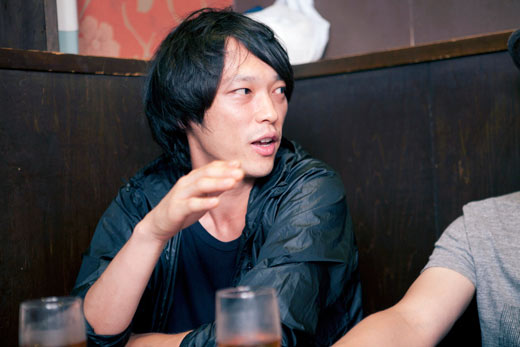
Kawasaki: Like how the other day when we played at O-WEST with kowloon and toe, we were moshing together with everyone in the audience. I think doing that kind of thing is perfect for destroying mouse on the keys’ “cool” image. But now we’re bored of that already and we want to start doing something in the exact opposite direction. I don’t know what that is exactly though. The band right now is going through a period of change and we want to have even more freedom in our playing.
Your DVD shows that growth, too. Your ad-libs and arrangements are really effective. It almost feels like a jam session sometimes.
Kawasaki: Right. That is thanks to our joint show with Aku. Aku is a hip-hop unit, but they’re really open to trying out anything. Senoo GEE crams a lot of words into his raps, and he does it in a way that leads to a lot of changes in rhythm. When we were ironing out the songs in rehearsal, they had lots of new ideas that we wouldn’t have been able to come up by ourselves.
Kiyota: They had a big impact on us both on a conscious level as well as on our way of performing.
Kawasaki: They did. When we finally did do that session with them we really enjoyed it and thought it was fun, so we did our third European tour full of that kind of feeling. If you want an example from the DVD… there’s the beginning of “Forgotten Children”, or like how freely we’re playing the tune that’s playing in the background when we’re crossing the Strait of Dover. We did this song called “wilted flowers” that has the lyrics from Aku’s charity song called “Yowayowashiku mo Sakiyagaru”; the “untitled” song that plays during the Warsaw scene is the instrumental of that.
Conversely, what was your approach to songwriting before that?
Kawasaki: Until now, I made everything on my computer, passed the data onto everyone and had them memorize it, and then the songs gradually took shape as we played them live. But now, rather than phrases, it’s more like we have these motifs that we try playing together. Then we just add the developments to it that we come up with. It’s a really free, experiment type of thing. We’d like to release something new that we made using that technique. The way we write songs has become more band-like. In that sense, mouse on the keys feels more like a proper band now. This DVD is like a waypoint to that.
Listening to what you have to say, as far as your overseas tours go, it feels like mouse on the keys is really an example of music overcoming the language barrier.
Kawasaki: Even if we don’t speak the language, we can communicate through our performance. I think that’s what’s gotten us this far. There was this one show we did where the staff was all cold like “who the hell are you guys anyway?“, but after our show they were all hugging us and stuff.
Niitome: Our English isn’t the best, but it turned out alright in the end.
Kawasaki: Tome can speak English, but our Mister Trumpet, Daisuke Sasaki, was really into using his peculiar English, too. (laughs)
Niitome: “You are beautiful.” That one always works. You’ll be able to communicate if you’re that straight-up. Well, in that particular example he managed to drive the girl away though. (laughs)
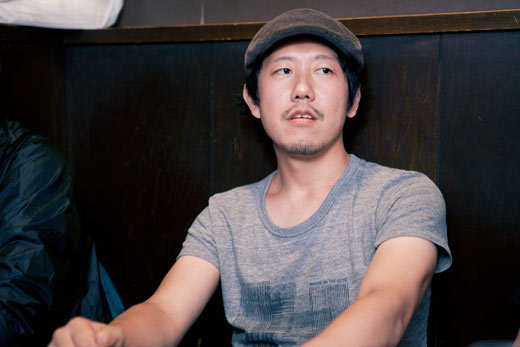
(laughs)
Niitome: During our first and second tours, no one from the venues knew mouse on the keys and none of their staff helped us out with anything. It was our PA guy Yama-chan and ourselves that set up everything for our shows. But after the show was over, they’d come to us and tell us “Thank you. Please come again.“
Kawasaki: If you really try your best, it’ll pay off. They’re very receptive listeners. When I experienced that… You know, I used to have this complex of how, because Japanese music has been influenced by Western music, that maybe it’s somehow a derivative of theirs. But when I went there myself, I realized that’s not the case. It’s just not well-known there is all.
I see. They don’t have the means to get that information, right?
Kawasaki: Now that it’s come to the point where even without a proper distribution channel for your music, the people over there are able to hear it and come see your shows, they’ve really started appreciating Japanese bands. That’s why we go play there. The DVD shows just that, too. We aren’t able to have very meaningful conversations with the people over there or anything, but I think it shows just how far you can take things by doing it the “D.I.Y.” style. I’d be happy if any young people were even a little bit influenced by seeing the DVD and came to think they want to go overseas, too.
It feels to me like our interview is somehow linked to our interview with LOSTAGE’s Gomi (Takahisa). In regards to running his own label, Gomi said he wanted to make his friends and acquaintances in other bands also think “oh, so you can do things that way, too.“
Niitome: That is exactly something we went to convey to people, too.
Kiyota: And not just band guys. It feels like if we could make people involved in labels or productions to realize it, too, this kind of thinking could spread a lot more.
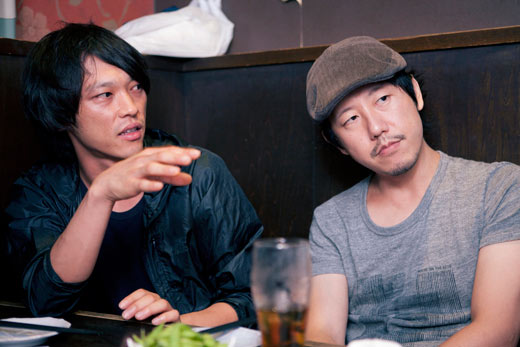
Kawasaki: Around ’95, groups like BOREDOMS and Shonen Knife were the pioneers in overseas activities, but from the bands we’re more familiar with, envy is one of the most prominent bands active there. We’ve been influenced by them, too. Kawaguchi Jun who shot “kocorono” also made a DVD of envy which shows their live scenes from overseas as well as their history and stuff. I think that to understand a part of the history of envy and other mid-to-late 90’s bands like NINE DAYS WONDER, There is a light that never goes out or Kulara, seeing that DVD of envy is a must. And I think the same could probably be said for the LOSTAGE documentary made by MINORxU.
I see. I’m starting to see the connection.
Kawasaki: What Kawaguchi and MINORxU are doing is capturing something that’s still so fresh that people might not realize the importance of it. But when you check their stuff out, you’ll find out the history of Japanese bands from mid-90’s until today, a period that just isn’t that well covered yet. MINORxU’ s been involved with a There is a light that never goes out documentary, a BREAKfAST DVD, a COMEBACK MY DAUGHTERS documentary… plus all kinds of bands from the mid-90’s until today.
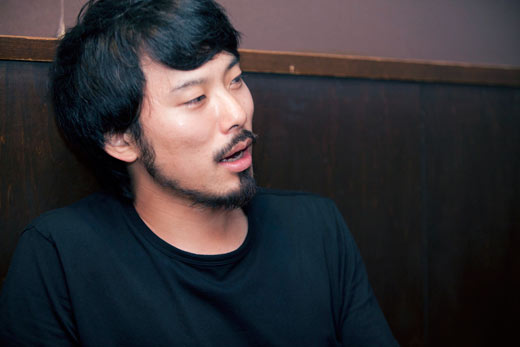
It does feel like not many people are aware of that context.
Kawasaki: I think this it’s something the music history writers haven’t touched on yet. In that sense, I feel that what people like Kawaguchi and MINORxU are doing is something very important. This is something that’s written on MINORxU’s site so I think it’s okay to say it here, but he’s actually working on a documentary showing the 90’s studio live scene. I think people are going to start waking up to it more if his documentary gets some attention.
Kiyota: Right. It’ll be like a compilation, or like a an easy to understand general framework for people.
Kawasaki: Personally, I don’t even know if it’s correct to call it the studio live “scene” or not. But I want to see it in any case. Of course there’s many interesting people aside from the two I just named. From the people I know, there’s also people like Ozeki (Ozeki Yasuyuki) who had a hand in making DVD’s for BREAKfAST and YOUR SONG IS GOOD, and Micchi (Saigo Michinori) who made a PV for us. Micchi has deep connection with 54-71 so I hope he makes a documentary about them sometime down the line. Also, he hasn’t released anything, but Tsuchiya Kyouhei is someone you maybe ought to keep an eye out for. He has a substantial archive. He has loads of precious footage of Japanese and American indie bands from I think 1999 onwards. I hope he makes a collection and releases those at some point.
Kiyota: Perhaps he started taking footage with the same mindset as MINORxU?
Kawasaki: Tsuchiya’s like a post-MINORxU. (laughs) When you get to know the history from the mid-90’s until today, I think you’ll really come to enjoy mouse on the keys and similar bands a lot more. The filmmakers I just named are all people knew well how things were back then. You should definitely check out their work. I think that LOSTAGE documentary is a must-see, too. I’m honored to think that MINORxU had a hand in making our DVD as well.
Editor’s postscript
Let me talk about why the backgrounds in the above pictures are different. We started the interview at Miyashita Park in Shibuya. Kawasaki laid down a picnic sheet on the wooden deck and we started our drinking/interviewing. But we quickly found out that the place would close at 18:30 due to electricity conservation, so our interview was interrupted after a mere five minutes. According to the manager’s instructions, we tearfully folded the sheet and moved over to the staircase at the side of the park.
We kept going despite the light rain that started soon after we resumed. I witnessed the hospitality of mouse on the keys as they all gave beer to the homeless man there. Finally, we had to escape to a nearby pub from the rain that was getting stronger and stronger. The place may have been running a karaoke box business on the side as we could hear the singing voices of several young men and women around us. But above all what caught our attention was the woman taking our orders and her tsundere personality. Perhaps her rotation of a sour face versus a smile was part of the service, too.
And that is pretty much how this super extensive interview came to be. Thank you once again, mouse on the keys!
Editor: Kato
